End of Summer Remembrance: The Rocketeer
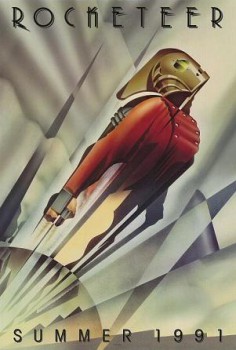 Update: Right as I was posting this review, I received the official news that Disney is releasing a 20th Anniversary Blu-ray of The Rocketeer. It will come out on December 13. No other technical information or details on extras are yet available. Disney should have planned this earlier, but the obvious reason they did it … Captain America. And my telepathic waves sent from writing this review.
Update: Right as I was posting this review, I received the official news that Disney is releasing a 20th Anniversary Blu-ray of The Rocketeer. It will come out on December 13. No other technical information or details on extras are yet available. Disney should have planned this earlier, but the obvious reason they did it … Captain America. And my telepathic waves sent from writing this review.
The summer is over, and it was a good one at the movies. It was certainly better than 2010, known as the year that Inception made everyone else look like idiots. This year the movies gave us more variety, more base hits, and a few home runs. Unfortunately, it also gave us the tremendous flop of Conan the Barbarian, but in a summer that took one of my beloved characters and put him in a great movie (Captain America: The First Avenger) and also refreshed one of my favorite film series with a stunning new kick-off (Rise of the Planet of the Apes), I have plenty to feel thankful for. Other films I enjoyed: X-Men: First Class, Hobo with a Shotgun, Harry Potter and the Deathly Hallows, Part 2 (and I’m not even much of a Potter fan), Attack the Block, Midnight in Paris, and Thor. I didn’t hate Green Lantern either!
But Captain America is the reason this post exists, because it got me thinking about 1991’s summer surprise and fan-favorite flick, The Rocketeer. The films share the same director, Joe Johnston, who is a natural with this sort of big-hearted, nostalgia-filled, period superhero film.
There is an unfortunate difference between the films, however. Captain America was a hit. The Rocketeer was considered a disappointment in 1991, and Disney ditched plans for a sequel. However, you would never know that the film was a box-office failure based on talking about it with people today. The Rocketeer has enormous fan-love.
Let me set the scene to explain one reason The Rocketeer is such a big hulking deal to me. The Summer of ’91 was an important one for Hollywood. This was the summer of Terminator 2: Judgment Day and the CGI Revolution. For me, it was the summer between the end of high school and the start of college. This is a time period where everything has the shimmer of a “Golden Age,” and The Rocketeer is a film that creates instant Golden Age nostalgia right as you walk out of the theater. No wonder it stood out for me; and people my age all seem to have a similar reaction to it.
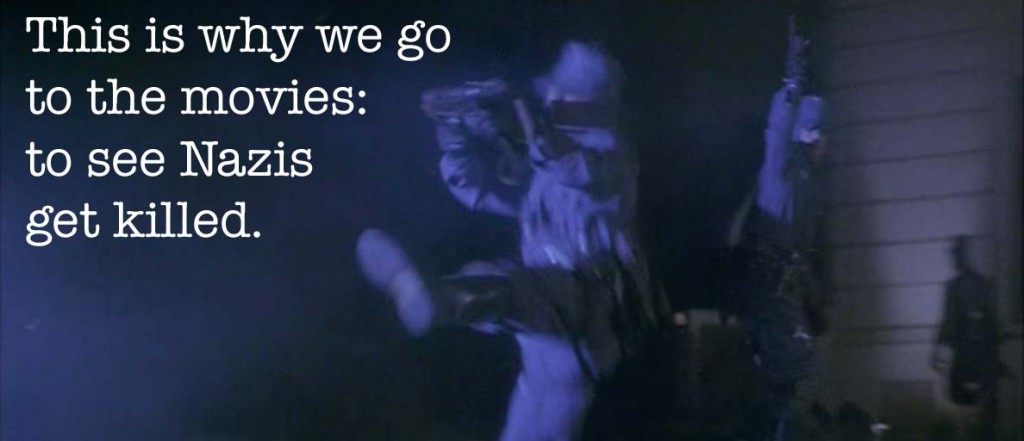 Twenty years have passed since the summer of The Rocketeer’s premiere. Twenty years. That astonishes me, because the film exists in a part of my memory where everything is fresh and green and nothing seems to age. And then I look at the calendar and do the math. 2011 – 1991 = 20. Damn, I hate math.
Twenty years have passed since the summer of The Rocketeer’s premiere. Twenty years. That astonishes me, because the film exists in a part of my memory where everything is fresh and green and nothing seems to age. And then I look at the calendar and do the math. 2011 – 1991 = 20. Damn, I hate math.
When I revved up my DVD of The Rocketeer to do this article, I realized there was a reason I had not given the film a view in a few years: the DVD is horrendous. I purchased it in 1999 the day it was released in the new format, and the disc displays all the flaws of early DVDs: a lazy transfer from a worn print, zero extras, dull compressed Dolby Surround without a 5.1 mix, and worst of all, a non-anamorphic letterbox presentation. This means that if you watch the movie on a widescreen television — now the default for most homes — the image appears shrunken in the middle of the screen and doesn’t stretch to fill it. You can manually enlarge the picture to fit a 16 x 9 screen, but this chops down the resolution, making the poor transfer look substantially worse, as if you were watching the movie through a screen door.
The biggest insult on top of this is that between 1999 and now, Disney has never released an improved DVD, and no Blu-ray plans are on the horizon, as was recently confirmed at a 20th Anniversary screening at the El Capitan theater in Hollywood. This piece of digital blarney is the only version of The Rocketeer available, and it dampened my spirits as I watched the disc. Disney either doesn’t know how many people love this film, or else doesn’t care. Equally likely conclusions. The company can do astounding home video releases when they feel like. When they don’t, they really don’t.
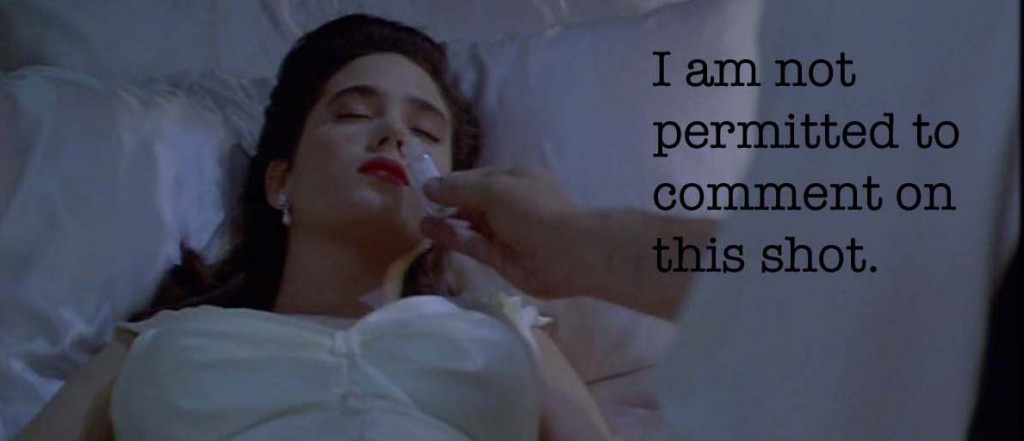 Hey Disney! Do you know that the same man who directed this summer’s hit period superhero movie Captain America also directed the period superhero movie The Rocketeer? Which, by the way, you own? Jump to it, Mouse! Golden opportunity. Maybe the massive attendance at the El Capitan for the anniversary will change your mind. (Update: Something changed their mind.)
Hey Disney! Do you know that the same man who directed this summer’s hit period superhero movie Captain America also directed the period superhero movie The Rocketeer? Which, by the way, you own? Jump to it, Mouse! Golden opportunity. Maybe the massive attendance at the El Capitan for the anniversary will change your mind. (Update: Something changed their mind.)
While watching The Rocketeer, the awful video presentation constantly intruded on my enjoyment. Cramped onto a tiny, blurry image, filled with dust and scratches and with a muddy version of the sound effects and James Horner’s charming score, the DVD threatened to make the movie’s wonder evaporate. No, make that “sublimate.” In order to give the old film a fair shake, I tried to remember how great it looked back on the El Capitan’s screen when I was a teenager. It helps, but still — The Rocketeer is difficult to enjoy in this format.
Okay, if I somehow shove past that … I still adore this movie. It is so unassumingly charming and so sincere in its goals that it rises above most empty blockbusters of yesteryear. Look at the Mission: Impossible films. Look at the Transformers films. Now look at The Rocketeer. See what I mean? Yeah, I still love this film.
But it is honest love, and I can see what holds the film back from being even greater, especially compared to the similar period charm and Nazi-fighting Captain America: The First Avenger, which is so far Johnston’s best film. Bill Campbell isn’t a charismatic enough leading man. The title hero doesn’t have enough big flying set-pieces and sometimes feels incidental to the story. The pacing feels off at times.
Well, so be it. The Rocketeer aimed primarily to achieve an old Hollywood serial feel, a do-it-yourself aesthetic, a love for the underdog, and an adoration for the 1930s, and it achieves all that. It certainly shows what a talent Johnston is when the material suits him.
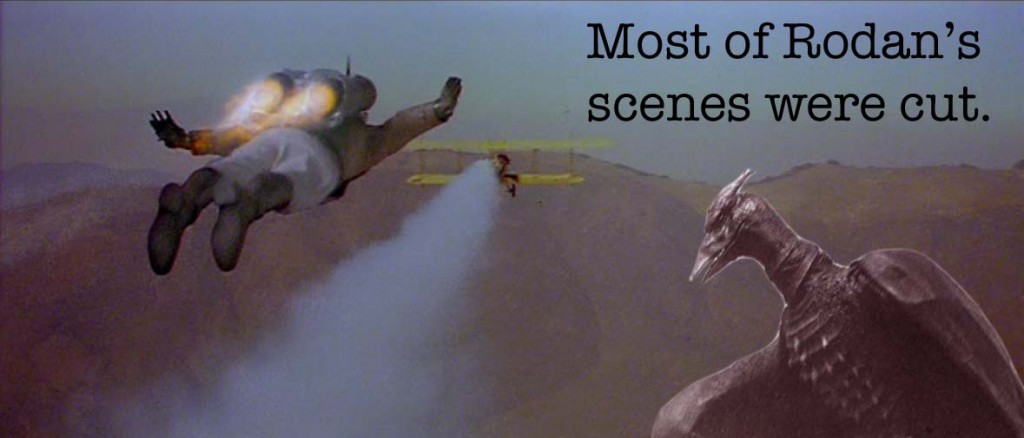 Starting with The Rocketeer, I’ve been a card-carrying member of the Joe Johnston fan club. He sometimes does poor movies, like Jumanji, for a paycheck; I don’t hold those against him. I see him as a sort of a junior Spielberg, chasing the dreams from Spielberg’s early career on a smaller scale. It makes sense that he directed the third Jurassic Park film and turned in a much better film than Spielberg did on the second. The playful, nostalgic Spielberg was in the same playground that Johnston wants to romp around in, and his three best films, The Rocketeer, October Sky (an unjustly overlooked ‘90s classic), and Captain America, we see him having the most fun on that jungle gym. I’m in lonely company here, but I also enjoyed The Wolfman. May Joe direct twenty more films! I’ll watch ‘em all.
Starting with The Rocketeer, I’ve been a card-carrying member of the Joe Johnston fan club. He sometimes does poor movies, like Jumanji, for a paycheck; I don’t hold those against him. I see him as a sort of a junior Spielberg, chasing the dreams from Spielberg’s early career on a smaller scale. It makes sense that he directed the third Jurassic Park film and turned in a much better film than Spielberg did on the second. The playful, nostalgic Spielberg was in the same playground that Johnston wants to romp around in, and his three best films, The Rocketeer, October Sky (an unjustly overlooked ‘90s classic), and Captain America, we see him having the most fun on that jungle gym. I’m in lonely company here, but I also enjoyed The Wolfman. May Joe direct twenty more films! I’ll watch ‘em all.
A disappointment I’ve always had with the film is that it doesn’t have enough bold flying action. The air show rescue is the only action set-piece that really unleashes the Rocketeer in full swooping, vertiginous action out in the opening. The other two flying sequences don’t really let the character fly free. The South Seas Club scene has the hero flying through corridors and under domed ceilings where he can’t do much. The Zeppelin finale is great, but not because of the Rocketeer’s amazing flying. Maybe it was a problem with the mid-level budget or the limitations of the effects, but the film’s action ends up feeling a bit, well, grounded.
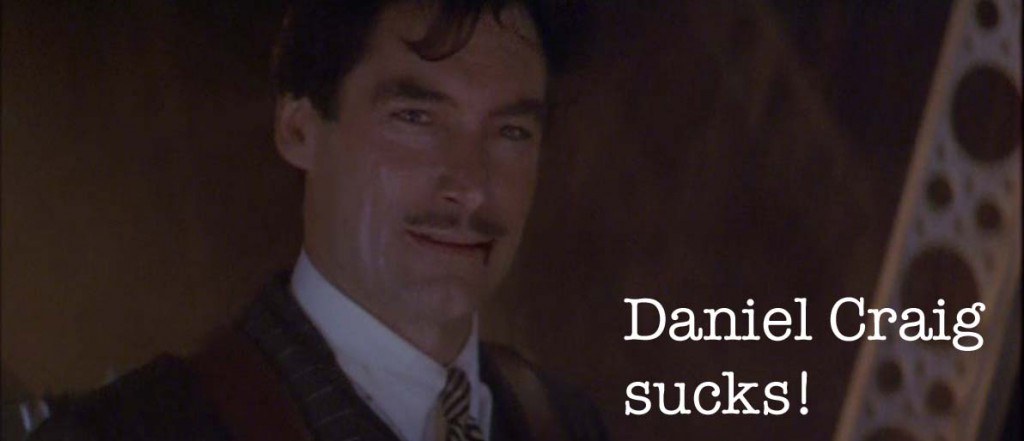 In fact, something surprising occurred to me while watching The Rocketeer this time: one of the less successful aspects of the film is the superhero of the title. Bill Campbell as Cliff Secord is adequate — he looks the part and seems comfortable around planes — but Secord isn’t a character with much charisma to start with. His superhero identity looks amazing, with one of the coolest helmets ever designed, but the Rocketeer himself never hits the mythic level, never develops the sense that the public loves him or that they would care if the hero continued on.
In fact, something surprising occurred to me while watching The Rocketeer this time: one of the less successful aspects of the film is the superhero of the title. Bill Campbell as Cliff Secord is adequate — he looks the part and seems comfortable around planes — but Secord isn’t a character with much charisma to start with. His superhero identity looks amazing, with one of the coolest helmets ever designed, but the Rocketeer himself never hits the mythic level, never develops the sense that the public loves him or that they would care if the hero continued on.
Normally, having this sort of problem with your costumed hero in a costumed hero movie would kill the movie. But … it doesn’t! The combination of style, a terrific supporting cast, and a fun script with surprises coming fast (A Spruce Goose joke! An animated Nazi propaganda film! A re-creation of the filming of The Adventures of Robin Hood!) that audiences can get into the character of the Rocketeer because the world around him is so wonderful. Having a great villain and stunning romantic lead also gives the Rocketeer’s jet-pack a big boost.
So let’s talk about the dastardly villain(s) and the pretty lady.
First, “pretty” doesn’t work as an adjective to describe how Jennifer Connelly appears in this movie. I’ll use another flashback to 1991 to describe it: I as well as every guy I knew was completely and helplessly in love with Jennifer Connelly in this movie before we even saw the movie. She had our attention earlier that year with Career Opportunities, a John Hughes-written and produced film that we went to see strictly because of how she appeared on the poster. The image of her in 1930s glamor outfits and sporting Bettie Page hair (by the way, the female lead in the comic books was based on Bettie Page and worked as a nude model, but Disney nixed this idea) was causing serious damage to our neurons.
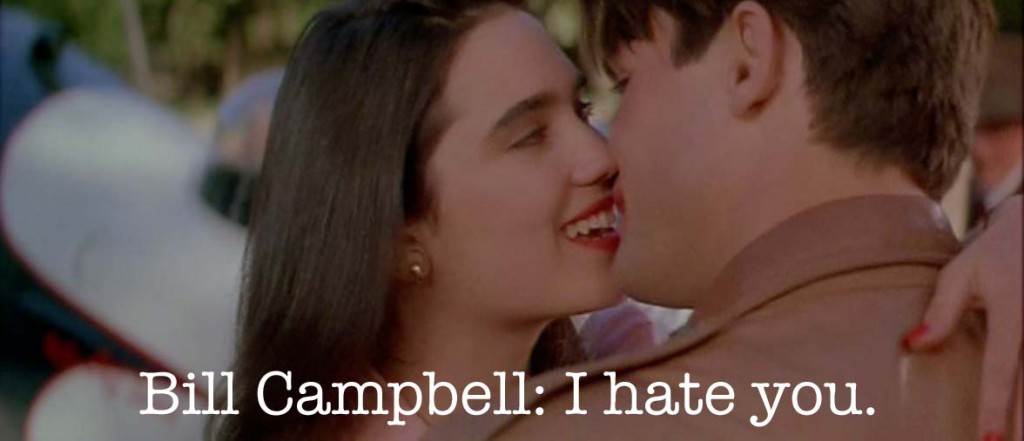 Moving back to today: Jennifer Connelly, Best Actress Oscar winner, gives a good performance as Jenny Blake in The Rocketeer. Not an amazing one, not one that indicates she would eventually win an Academy Award. However, she simply feels right in the setting, as if the only movies she should ever be in are period 1930s and ‘40s flicks. She projects enormous sex appeal, especially in her scenes with Timothy Dalton, which are steamy in the fiery way of classic films of the era. There’s terrific tension between the two, a combination of attraction and manipulation. The way Jenny keeps picking up on Neville Sinclair’s romantic seduction ploys as lines lifted from his movies (and Jenny knows his leading lady in each case) is simply great material, and Connelly shines at this. And when I see her in this movie, I’m still in love with the way I was in love with her as an eighteen-year-old kid.
Moving back to today: Jennifer Connelly, Best Actress Oscar winner, gives a good performance as Jenny Blake in The Rocketeer. Not an amazing one, not one that indicates she would eventually win an Academy Award. However, she simply feels right in the setting, as if the only movies she should ever be in are period 1930s and ‘40s flicks. She projects enormous sex appeal, especially in her scenes with Timothy Dalton, which are steamy in the fiery way of classic films of the era. There’s terrific tension between the two, a combination of attraction and manipulation. The way Jenny keeps picking up on Neville Sinclair’s romantic seduction ploys as lines lifted from his movies (and Jenny knows his leading lady in each case) is simply great material, and Connelly shines at this. And when I see her in this movie, I’m still in love with the way I was in love with her as an eighteen-year-old kid.
The Rocketeer has quite a few villains, and they all work. Cliff Secord not only has to deal with a Nazi spy disguised as a Hollywood star, but also a super-strong back-breaking thug named Lothar, the most powerful mobster in L.A. and all his goons, and the G-men who want to nail him for using a top secret rocket pack.
Ah, Timothy Dalton. What might have been if MGM’s legal tangles had not delayed the James Bond series for six years and Dalton had chosen to stay on a Bond! The guy has the perfect combination of cool and lethal for 007, fitting Fleming’s character closer than any other actor who has played him. But when The Rocketeer came out in 1991, people weren’t talking about Dalton playing Bond — they were talking about Dalton playing Robin Hood! The Kevin Costner-starring Robin Hood: Prince of Thieves was the first big hit of the summer, but jokes about Costner’s miscasting were legendary. Then Dalton jumped on screen playing an ersatz Errol Flynn, even getting to imitate Flynn in a scene filming a movie called The Laughing Bandit that is a barely disguised substitute for 1938’s The Adventures of Robin Hood. “Why wasn’t this guy playing Robin Hood?” was asked in every review of The Rocketeer from that summer.
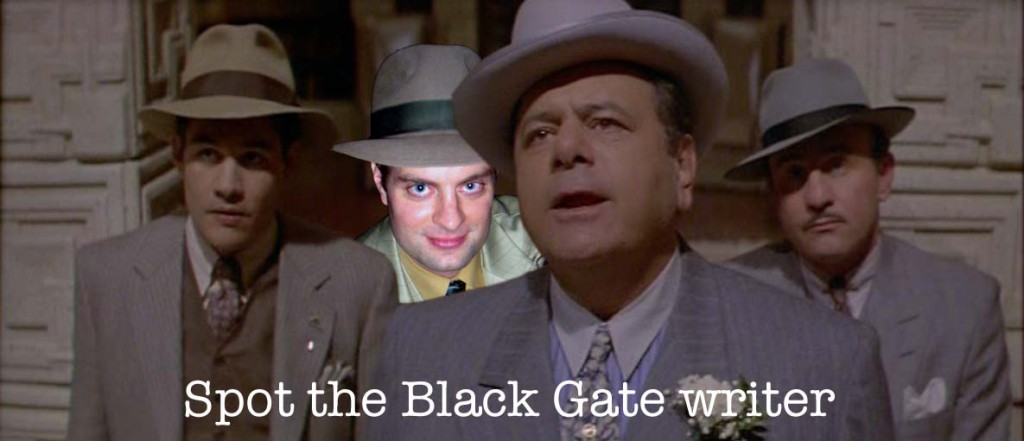 Dalton kills it as Neville Sinclair, sophisticated box office-topping movie star who is also a Nazi spy and saboteur who lives in one of Frank Lloyd Wright’s California homes with a seven-foot tall personal enforcer wearing Rick Baker make-up so he looks like 1940s monster actor Rondo Hatton. Yes, this all makes no sense — how long ago did the Nazis plant this guy in Hollywood, and how were they certain he would become a huge celebrity? — but Dalton makes the man’s evil charm and growing megalomania believable and great fun. Although, now that I’ve seen Captain America, I can’t watch The Rocketeer without wondering if the entire Nazi scheme was masterminded by the Red Skull and Neville Sinclair was just his point man.
Dalton kills it as Neville Sinclair, sophisticated box office-topping movie star who is also a Nazi spy and saboteur who lives in one of Frank Lloyd Wright’s California homes with a seven-foot tall personal enforcer wearing Rick Baker make-up so he looks like 1940s monster actor Rondo Hatton. Yes, this all makes no sense — how long ago did the Nazis plant this guy in Hollywood, and how were they certain he would become a huge celebrity? — but Dalton makes the man’s evil charm and growing megalomania believable and great fun. Although, now that I’ve seen Captain America, I can’t watch The Rocketeer without wondering if the entire Nazi scheme was masterminded by the Red Skull and Neville Sinclair was just his point man.
The hoodlums are all old Hollywood stereotypes, which is exactly what they should be. Every gangster actor turns in the right amount of sneering tough-guy attitude that they seem like they would be perfect supporting players in a James Cagney movie. It’s a blast seeing them turn their allegiance around and join the government agents in raining bullets down on the Nazi goons in the finale.
Paul Sorvino is especially cool as big-time mobster and club owner Eddie Valentine. He gets the film’s best line when he discovers that his paymaster is a German spy: “I may not make an honest buck, but I’m a hundred percent American. And I don’t work for no two-bit Nazi.” I’ve been waiting years for an excuse to use that line in casual company. However, I make an honest buck and no Nazi has tried to hire me, so I’m stuck with screaming, “Dogs and cats living together, mass hysteria!” instead.
The action at the South Seas Club isn’t high flying, but it’s still a great sequence because of all the 1930s Hollywood glamor that Johnston pours onto it, much the way he would later handle the USO performances in Captain America. Although the band playing at the South Seas Club is unidentified, it is clearly meant to be Artie Shaw and His Orchestra. The band plays Shaw’s arrangement of his big hit, “Begin the Beguine,” the number one chart-topper for the year the film takes place, and the actor playing the clarinet is a dead-ringer for Shaw. Considering that Clark Cable and W. C. Fields pop-up in the same scene, it has to be Shaw, and his singer (played by Melora Hardin) would have to be his chanteuse at the time, Helen Forrest. I think this scene started my personal love for 1930s swing music, which a few years later would make me a Lindy Hopper and a hardcore Artie Shaw fan. Thanks Rocketeer! And “Begin the Beguine,” despite Shaw’s later distaste for its fame, is one of the greatest popular songs ever written. So again, thanks Rocketeer!
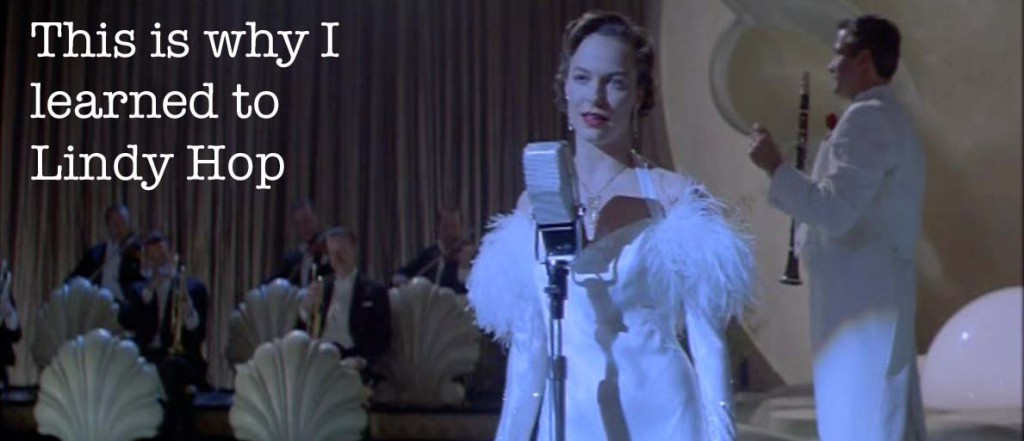 The finale, despite a lack of much flying, is a corker: gangsters in a shoot-out with Nazis at Griffith Park Observatory, a fight on top of a blimp, a gag with the Hollywood(land) sign, a villain defeated by chewing gum, Howard Hughes flying a gyrocopter, and the Nazis learning another lesson about hydrogen vs. helium.
The finale, despite a lack of much flying, is a corker: gangsters in a shoot-out with Nazis at Griffith Park Observatory, a fight on top of a blimp, a gag with the Hollywood(land) sign, a villain defeated by chewing gum, Howard Hughes flying a gyrocopter, and the Nazis learning another lesson about hydrogen vs. helium.
Whatever limits Industrial Light & Magic had to deal with, they worked through it: the flying work still looks good, even in the digital age. It was the best “flying man” effect put on screen since the two Superman movies.
This is one of James Horner’s best scores. Horner often uses a repetitive style that makes many of his scores run together, but when he’s good, he’s Star Trek II: The Wrath of Khan good. Horner’s score here makes all the right decisions, going for charm over bombast and generic action cues. His main theme, which starts over the opening credits on a solo piano and then opens up to golden soaring flying sound, is versatile enough to play both gentle moments and the hero poses. His theme for Jenny, which only gets its fullest statement during the end credits, is sumptuously beautiful.
The Rocketeer twenty years later is still as fun, even with its flaws, as it was in the summer of ’91. It will probably feel the same way in the summer of 2031. And maybe by that time Disney will have finally given it the home video treatment it deserves.
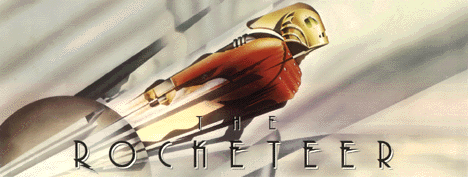
I saw that The Rocketeer will be coming out on Bluray, December 13th. The price is under $20. This leads me to believe the only reason their doing it is to capitalise on the success of Captain America, and that it’s unlikely to be more than a simple transfer with no special features.
Other than that, I completely agree. I think this movies is vastly underrated.
Yes, the announcement of the Blu-ray came while I was finishing the review. I’d like to think it was my angry psychic waves that caused it, or they just wanted to screw with my timing, but yeah, it was Captain America.
So, on December 14th, everyone is invited to my apartment for a Blu-ray double-feature party of The Rocketeer and Captain America!
This was a nostalgic post! I remember when I was five and first saw the trailer for this movie- it was so awesome! It wasn’t until 2005 that I bought the DVD and watched it. What a great movie. . . They don’t make them like this anymore.
Mister_Alex… you saw the trailer when you were (*choke*) five? Oh dear. It was one of the first movies I dragged my girlfriend Alice to, and I was 27.
I loved the comic, and was anxious to see who they would get to play Bettie Page – I mean, Jenny. And yeah. She was a knockout in this movie.
I hadn’t seen it in almost 18 years when I finally bought the DVD and showed it to my kids. They didn’t really see the attraction. Maybe I should have waited for the Blu-Ray.
And hey! What’s the matter with JUMANJI?? I liked that movie too. Although ZATHURA was better.
I was only 10 when the movie came out. My Dad and I went to a midnight showing. I wonder if I still have the t-shirt?
I hope they at least try to restore the film somewhat. Several live action Disney films I own were simply transferred onto DVD in rather deplorable condition. I’m far from being a videophile, but The Rocketeer, the Three Musketeers and Shipwrecked frankly deserve better.
this movie is the freakin business and anyone who’s opinion is worth a damn thinks so too.
i was born in 87′ so i didn’t see it in 91 when it came out but i was lucky enough to have my parents share it with me when i was 8 or 9ish. loved it. and you were absolutely right about everything in this review concerning the nostalgia and how INCREDIBLE jennifer connelly looks in this movie. i’ve been trying to find a similar white satin dress for my girlfriend for YEARS.
but i have to agree with john Oneill concerning Jumanji. to this day if i hear those drums i start freaking out.
anyway nice review, it was a fun little time wasting read.
[…] But we got a few interesting films during the retro-hero phase, such as Dick Tracy, the well-loved The Rocketeer.… and the semi-forgotten The Shadow, which came out on Blu-ray this week to offer its mixture of […]